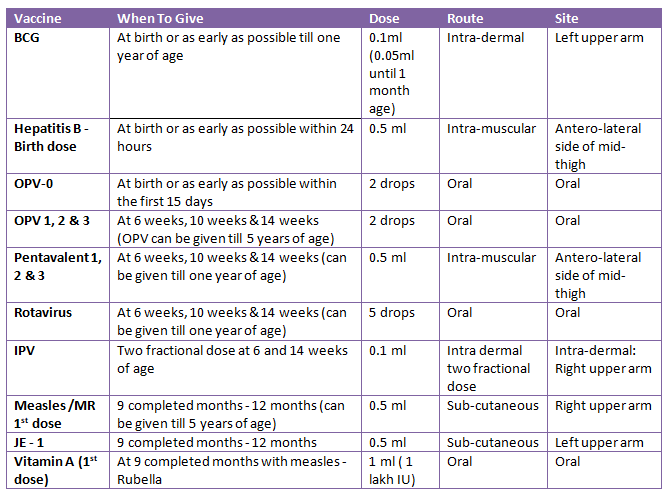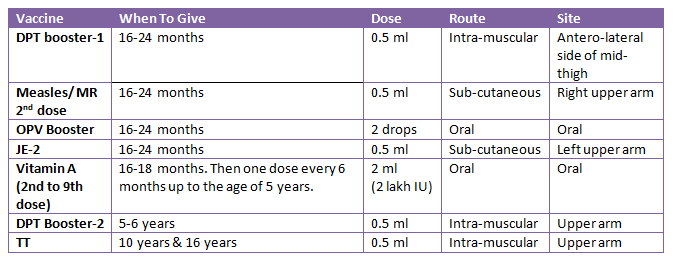It was initially said that Infectious Diseases will last as long as humanity itself . Over the past century, we have seen an Epidemiological transition from Communicable diseases to Non- communicable diseases as a major contributor to mortality and morbidity in Most of the Developed countries. However, India, being a developing country still faces a major challenge in form of communicable diseases who contribute to the majority of disease burden in our country. According to WHO, Immunization is the process whereby a person is made immune or resistant to an infectious disease, typically by the administration of a vaccine. Vaccines stimulate the body’s own immune system to protect the person against subsequent infection or disease.
Vaccines are a cornerstone of public health, and one of the most cost-effective means of preventing several infectious diseases ranging from acute (e.g. measles and mumps) to chronic diseases (e.g. chronic hepatitis B), and some virus-related human cancers (e.g. liver and cervical cancer). Immunization has helped in a significant reduction in child mortality as well. Because of the strict and efficacious immunization programme we were able to eradicate Small Pox on a worldwide basis in May 1980 which was one of the most dreaded diseases at one time. Poliomyelitis is also nearing eradication; a large number of deaths from measles are being averted every year. The number of deaths caused by traditional vaccine-preventable diseases (diphtheria, measles, neonatal tetanus, pertussis and poliomyelitis) has fallen from an estimated 0.9 million to 0.4 million.
Also Read: Anganwadi Centres, Schools, Panchayat Buildings To Be Used As COVID-19 Vaccination Sites
New and increasingly sophisticated vaccines that have become available in the last decade, including pneumococcal conjugate vaccine and vaccines against infection with rotavirus and human papillomavirus, are currently being rolled out globally.
WHO has developed a Global Action Plan for Vaccination to increase immunization coverage in the ongoing decade. It establishes Immunization as a fundamental Right to everyone. Financing from domestic budgets allocated to immunization programmes has risen over the past decade, as has the flow of international resources dedicated to immunization.
Vaccination In Pregnancy
As Advised by Universal Immunization Programme put forth by the Government of India. Following vaccination should be administered to every pregnant female in the country:
Note: Give TT-2 or Booster doses before 36 weeks of pregnancy. However, give these even if more than 36 weeks have passed. Give TT to a woman in labor, if she has not previously received TT (tetanus toxoid).
Vaccination In Infants And Children
Today, four out of every five children receive at least a basic set of vaccinations during infancy and are therefore able to lead healthier, more productive lives. Unfortunately, this means one child in every five is not being reached. The following schedule has been put forward and integrated into the national health programmes by the Government of India:
Note: Pentavalent vaccines contains a combination of DPT (Diphtheria, Tetanus, Pertussis) , HepB and Hib. In the states where it has been introduced, it will replace DPT 1,2 & 3 and Hepatitis B 1, 2 & 3. Hepatitis B birth dose and booster doses of DPT will continue as before.
JE (Japanese Encephalitis) Vaccine (SA 14-14-2) is given in select endemic districts after the campaign is over in that district.
Vaccination In Children And Adolescents
Vaccination protects children from serious illnesses. Vaccine-preventable diseases, such as measles, mumps, and whooping cough are major contributors to mortality and morbidity in developing countries. If children aren’t vaccinated, they can spread the disease to other children who are too young to be vaccinated or to people with weakened immune systems, such as transplant recipients and people with cancer.
Vaccination is very safe and effective for prevention of communicable diseases. Vaccines have reduced and, in some cases, eliminated many diseases that killed or severely disabled people just a few generations ago. For example, smallpox vaccination eradicated that disease worldwide.
Also Read: An Easy To Use Vaccine Delivery Kit Aims To Improve Immunisation In Rural India
Vaccination In Adult
Vaccinations aren’t just for children. Adults need them too at times, depending on factors such as age, health conditions, travel plans and personal vaccination record. Adults can be vaccinated for a range of diseases such as swine flu, typhoid, hepatitis, tetanus and pneumonia. Vaccines such as hepatitis A and B, pneumococcal and meningococcal meningitis, rabies, human papillomavirus vaccine and tetanus are the most common vaccinations given in India.
Haemophilus Influenza B Immunization:
It should be given in adults undergoing elective splenectomy or patients with asplenia. It can also be given in adults with complement system deficiency or on complement system inhibitors.
Pneumococcal Vaccine:
All adults 65 years or older should receive a dose of PPSV23 (pneumococcal 23-valent polysaccharide vaccine).
Human Papillomavirus Vaccine:
In June 2019, ACIP recommended catch-up HPV vaccination for all adults through age 26 years who are not adequately vaccinated. HPV (human papillomavirus) vaccines are not licensed for use in adults older than age 45 years.
Also Read: Universal Coverage Or Immunisation For All Is Still A Long Wait
Hepatitis B Vaccination:
The populations at risk for hepatitis B infection includes:
- Persons with hepatitis C,
- Cirrhosis,
- Fatty liver disease,
- Alcoholic liver disease,
- Autoimmune hepatitis,
- Liver transaminases level greater than twice the upper limit of normal,
- Persons with HIV infection, sexual exposure risk (e.g., sex partners of hepatitis B surface antigen [HBsAg]–positive persons, sexually active persons not in mutually monogamous relationships, persons seeking evaluation or treatment of a sexually transmitted infection, men who have sex with men),
- Current or recent injection drug use,
- Percutaneous or mucosal risk for exposure to blood including health care workers
- Persons traveling in countries with high or intermediate endemic hepatitis B.
Travel Immunisation
It is important to take vaccines as precautions while travelling to certain countries. For example, yellow fever vaccination is needed by Indians travelling to African countries. Similarly, vaccinations against tuberculosis, typhoid and meningococcal meningitis are required if you travel to the United States or European countries.
Getting immunized is important for at least two reasons: to protect yourself and to protect those around you. Vaccines are the best way we have to prevent infectious diseases.
Dr. R. P. Ram is working as Consultant to the Department of Internal Medicine, Cardio Metabolic Specialist, Diabetes and Clinical Cardiology at Jaslok Hospital and Research Centre, Mumbai.
Disclaimer: The opinions expressed within this article are the personal opinions of the author. The facts and opinions appearing in the article do not reflect the views of NDTV and NDTV does not assume any responsibility or liability for the same.
NDTV – Dettol Banega Swasth India campaign is an extension of the five-year-old Banega Swachh India initiative helmed by Campaign Ambassador Amitabh Bachchan. It aims to spread awareness about critical health issues facing the country. In wake of the current COVID-19 pandemic, the need for WASH (Water, Sanitation and Hygiene) is reaffirmed as handwashing is one of the ways to prevent Coronavirus infection and other diseases. The campaign highlights the importance of nutrition and healthcare for women and children to prevent maternal and child mortality, fight malnutrition, stunting, wasting, anaemia and disease prevention through vaccines. Importance of programmes like Public Distribution System (PDS), Mid-day Meal Scheme, POSHAN Abhiyan and the role of Aganwadis and ASHA workers are also covered. Only a Swachh or clean India where toilets are used and open defecation free (ODF) status achieved as part of the Swachh Bharat Abhiyan launched by Prime Minister Narendra Modi in 2014, can eradicate diseases like diahorrea and become a Swasth or healthy India. The campaign will continue to cover issues like air pollution, waste management, plastic ban, manual scavenging and sanitation workers and menstrual hygiene.
[corona_data_new]























